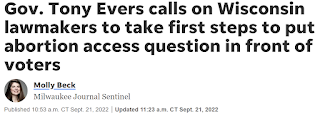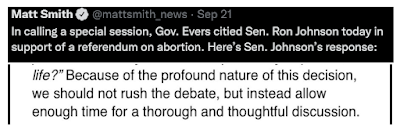"The tired, old Evers approach has not worked. He's spent his career in education and our schools keep getting worse, especially (Milwaukee). I will get Wisconsin headed in the right direction. I will empower parents with greater access to information and more options for their kids."
Uh, "Especially Milwaukee," birthplace of the Parental Choice Program, where it's Failing? I'll bet Michels is unaware of Milwaukee's "choice" history, which isn't a great starting point for him. Vouchers were designed by Republicans to kill public schools, leaving it devoid of good government planning (on purpose). That's basically what charter backer the Fordham Institute reported:
In 1991, Milwaukee began a bold experiment in market-based education reform. Twenty-seven years later, those reforms are something less than dramatic. The original voucher coalition was a clumsy alliance of free-market reformers, social justice warriors, urban Democrats, and suburban and rural Republicans.A program design encouraging the creation of new schools simultaneously led to frequent school failures that hurt the program’s reputation. Between 1991 and 2015, 102 participating schools shut their doors. For many years, opening a voucher school was as simple as filing a one-page form with the state, finding a building, and convincing parents to enroll their children. Some of these schools were of shockingly low quality, creating a public narrative that millions of dollars were being sent to storefront scam-artists running schools in name only.
At one point in the early 2000s, voucher supporters’ longstanding resistance to standardized testing of MPCP pupils. To put it mildly, student performance was not driving legislative decision-making during this period. The result was a clumsy regulatory structure that changed frequently, failed to adequately target problem schools, and was divorced from the goal of improving academic achievement.
The fragmented structure ensures that positive reform in any one of the city’s three sectors will fail to improve the lot of a sizable slice of Milwaukee’s K–12 population.
None of these successes mask the MPCP’s failure to deliver substantive academic gains for K–12 pupils in Milwaukee.
But until a mechanism exists for creating funding and regulatory equity, outcomes-oriented accountability across sectors, and an arena to resolve issues impacting students across Milwaukee’s diverse school spectrum, we should expect to see more of the same. For now, Milwaukee’s voucher experience stands as a cautionary tale on the consequences of governance fragmentation.
A September 2013 item from PolitiFact Wisconsin, we rated Mostly False a Walker claim that Doyle’s policies cost the state 133,000 jobs. Walker, we noted, got the number right. But experts said the national economic crash (Great Recession) had far more to do with Wisconsin’s job losses during that period than any state policies.Again, this was a major Republican failure that would reverberate for decades, especially in education. For fun, here's Alan Greenspan admitting point blank the free market failure.
I’ve argued before that the Great Recession had a negative impact on the achievement of our poor and working-class students. That impact came directly in the form of the difficult years for families when these students were infants, toddlers, and preschoolers. Income plummeted. Poverty rates rose. Food insecurity grew. All of this would make a difference with these tykes’ later achievement. Consider, for example, findings from NWEA that showed declining test scores at kindergarten entry in the early 2010s. I suspect this also explains why so many of our social indicators were heading in the wrong direction even before the pandemic—such as the murder rate, auto accidents, and more. The downstream effects of early-childhood hardship can take years or even decades to become clear.The impact of the Great Recession also happened indirectly, in the form of the dramatic K–12 spending cuts that happened from 2011 to 2014. Kirabo Jackson showed convincingly that these cuts had a negative impact on achievement.
They could have been talking about Scott Walker:
Walker’s first five years, schools received a total of $1.17 billion less in state aid than if the funding had remained at the base level.The Pandemic: Thanks to Trump's bumbling chaotic mishandling of the pandemic, and Republican claims that it was never a problem, The Fordham Institute reported this unsettling reality:
In Washington, D.C., one figure stands out: 9 percent. That’s how many Black boys met expectations in math on the recently released 2022 student achievement results in the city’s district schools. On the eve of the pandemic in 2019, 17 percent of Black boys in district schools met those same expectations. The word “disaster” is used a lot lately, but it is absolutely the right fit here.
But what about the other half of D.C.’s schools, the charter sector? Sadly, 9 percent is also the percentage of Black boys in D.C. charter schools who met math expectations in 2022. That’s down from 22 percent in 2019, an even sharper decline than in Washington’s district-operated schools ... some of D.C.’s most prominent charter schools dropped by previously unimaginable amounts.
The charter school sector in D.C., seems to have had a particularly difficult transition to an all-virtual environment. This shouldn’t be a total surprise, considering that virtual charter schools across the country have displayed weak results over the years.
WI Maga Republicans picked this time to NOT fund Education, when Students need to catch-up most: Here's what they did instead:
Students, elected officials, education, community and business leaders from around south-central Wisconsin held a press conference on the steps of the State Capitol to kick off a statewide “Day of Action” protesting the Legislature’s proposed K-12 funding."A $0 per student increase on K-12 funding for the 2021-2023 Biennium State Budget, as was recently passed by the Joint Finance Committee, is not sufficient to support pre-K-12 education.”









